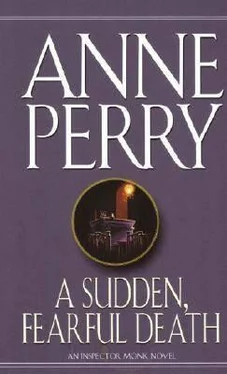"And she had an excellent motive in jealousy," Hester agreed. "But would she be strong enough?"
"Oh yes," he said without hesitation. "She is a fine horsewoman. I watched her the other day reining in an animal any man would have trouble mastering. She has the strength, especially if she took someone by surprise."
"And I suppose she could have passed herself off as a nurse if she had a plain enough dress," she said thoughtfully. "But there is nothing to prove that she did."
"I know that." His voice rose sharply. "If there were I would have taken it to Jeavis."
"Anything else?"
"Nothing indicative."
"Then I suppose we had better return to work and try harder." She rose to her feet. "I think I shall see if I can learn more about some of the governors-and Sir Herbert and Dr. Beck."
He moved to stand between her and the door, his face suddenly completely serious, his eyes intent on hers.
"Be careful, Hester! Someone murdered Prudence Barrymore-not in a fight and not by accident. He will just as easily kill you if you let him think he has cause."
"Of course I will be careful," she said with a quick rush of warmth. "I am not asking questions, I am simply observing."
"Possibly," he conceded doubtfully.
"What are you going to do?"
"Investigate the student doctors."
'Tell me if there is anything I can do to be of help. I may learn something of them." He was standing close to her, listening, watching her face. "They seem very ordinary to me so far, overworked, eager to learn, arrogant toward the female staff, full of stupid jokes to offset the distress they feel when people die and their own inadequacy, always poor and often hungry and tired. They make bad jokes about Sir Herbert, but they admire him immensely."
"Do you?" Suddenly he seemed more interested.
"Yes," she answered with surprise. "Yes. I think I do, now."
"Be careful, Hester!" he said again, urgency mounting in his voice.
"You already said that, and I promised I would. Good night."
"Good night…"
* * * * *
The following day she had several hours off duty, and used them to visit two people for whom she had formed a considerable friendship. One was Major Hercules Tiplady, although the "Hercules" was a secret between them which she had promised not to reveal. She had been nursing him privately during his recovery from a badly broken leg while she was involved in the Carlyon case, and she had grown unusually fond of him. She did not often feel more than a regard and a responsibility toward her patients, but for the ' major she had developed a genuine friendship.
She had known Edith Sobell before the case. It was their friendship which had drawn her into it, and through that hectic time they had become very close. When Edith had left home it had been Hester who had made it possible by introducing her to the major, and from that had sprung his offer to employ her, a widow with no professional skills, as his secretary and assistant to help him write his memoirs of his experiences in India.
Hester arrived in the early afternoon, without having given notice of her intention because there had been no time. However, she was welcomed in with delight and an immediate abandonment of all work.
"Hester! How wonderful to see you. How are you? You look so tired, my dear. Do come in and tell us how you are, and let us fetch tea for you. You are stopping, aren't you?" Edith's curious face, at once plain and beautiful, was shining with enthusiasm.
"Of course she is staying," the major said quickly. He was fully restored to health now and walked with only the barest limp. Hester had never seen him active before, and it was quite startling to have him upright and attending to her, rather than her assisting him. All the marks of pain and frustration were gone from his face and he still looked as scrubbed pink and clean and his hair stood up like a white crest.
She acquiesced with pleasure. It was a warm, very sweet feeling to be among friends again, and with no duties to perform and nothing expected of her beyond tea and conversation.
"Who are you with now? Where are you nursing?" Edith asked eagerly, folding herself into a large armchair in a characteristic gawky mixture of grace and inelegance. It delighted Hester to see it: it meant she was utterly at home here. There was no perching on the edge of the chair, back straight, skirts arranged, hands folded as a lady should. Hester found herself relaxing also, and smiling for no particular reason.
"At the Royal Free Hospital on the Gray's Inn Road," she replied.
"A hospital?" Major Tiplady was amazed. "Not privately? Why? I thought you found it too…" He hesitated, unsure how to say what he meant diplomatically.
"Restricting to your temper," Edith finished for him.
"It is," Hester agreed, still smiling. "I am only there temporarily. It was very civil of you not to remind me that I am also fortunate to find a hospital which will take me after my last experience. Lady Callandra Daviot is on the Board of Governors. She obtained the position for me because their best nurse, another from the Crimea, was murdered."
"Oh how terrible!" Edith's face fell. "How did it happen?"
"We don't know," Hester replied with a return to gravity. "Lady Callandra has called Monk into the case, as well as the police, of course. And that is why I am there."
"Ah!" The major's eyes lit with enthusiasm. "So you are engaged upon detection again." Then he also became very grave. "Do be careful, my dear. Such an undertaking may become dangerous if your intent is realized."
"You have no need for concern," Hester assured him. "I am simply a nurse working like any other." She smiled broadly. "Such dislike as I have collected is because I served in the Crimea and am bossy and opinionated."
"And what was the dead nurse like?" Edith inquired.
"Bossy and opinionated." Hester gave a wry smile. "But truly, if that were a motive for murder there would be few of us left."
"Have you any idea why she was killed?" the major asked, leaning over the back of the chair in which Edith was sitting.
"No-no we haven't. There are several possibilities. Monk is looking into some of them. I should like to find out more about a German doctor who is working there. I admit I like him and am more eager to prove his innocence than his guilt. I wonder if…" Then she stopped. What she had been going to say sounded impertinent now.
"We could help you," the major finished for her. "We should be delighted. Tell us his name, and what you know about him, and we shall search for the rest. You may depend upon us. Mayn't she, Edith?"
"Most certainly," Edith said keenly. "I have become really quite good at discovering things-in a literary sort of way, of course." She smiled ruefully, her individual face with its curved nose and humorous mouth showing her perception of the difference between research and detection as she thought Hester practiced it. "But I imagine much will be known of him by hospitals where he has worked before. I shallpursue it straightaway. There are medical authorities who have lists of all sorts." She rearranged herself a little more comfortably. "But tell us what else you have been doing. How are you? You do look rather tired."
"I shall order tea," the major said with decision. "You must be thirsty. It's terribly hot today, and no doubt you walked at least some of the way. Would you like some cucumber sandwiches? And perhaps tomato? I remember you were always fond of tomato."
"I should love some." Hester accepted with pleasure, for the refreshment itself, but even more for the friendship and the simple warmth of the occasion. She looked up at the major and smiled. "How thoughtful of you to remember."
He blushed very faintly and went off about his errand, beaming with satisfaction.
Читать дальше












